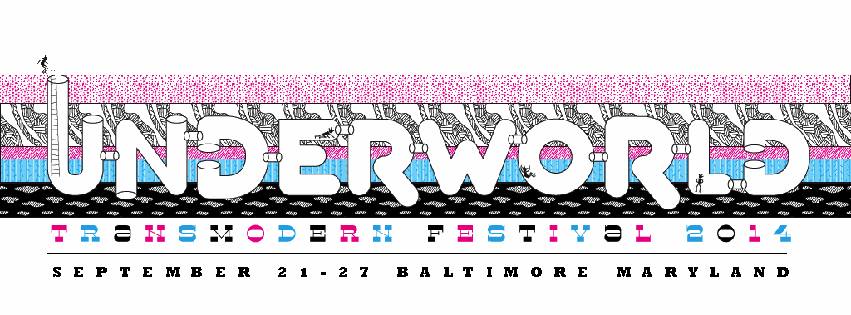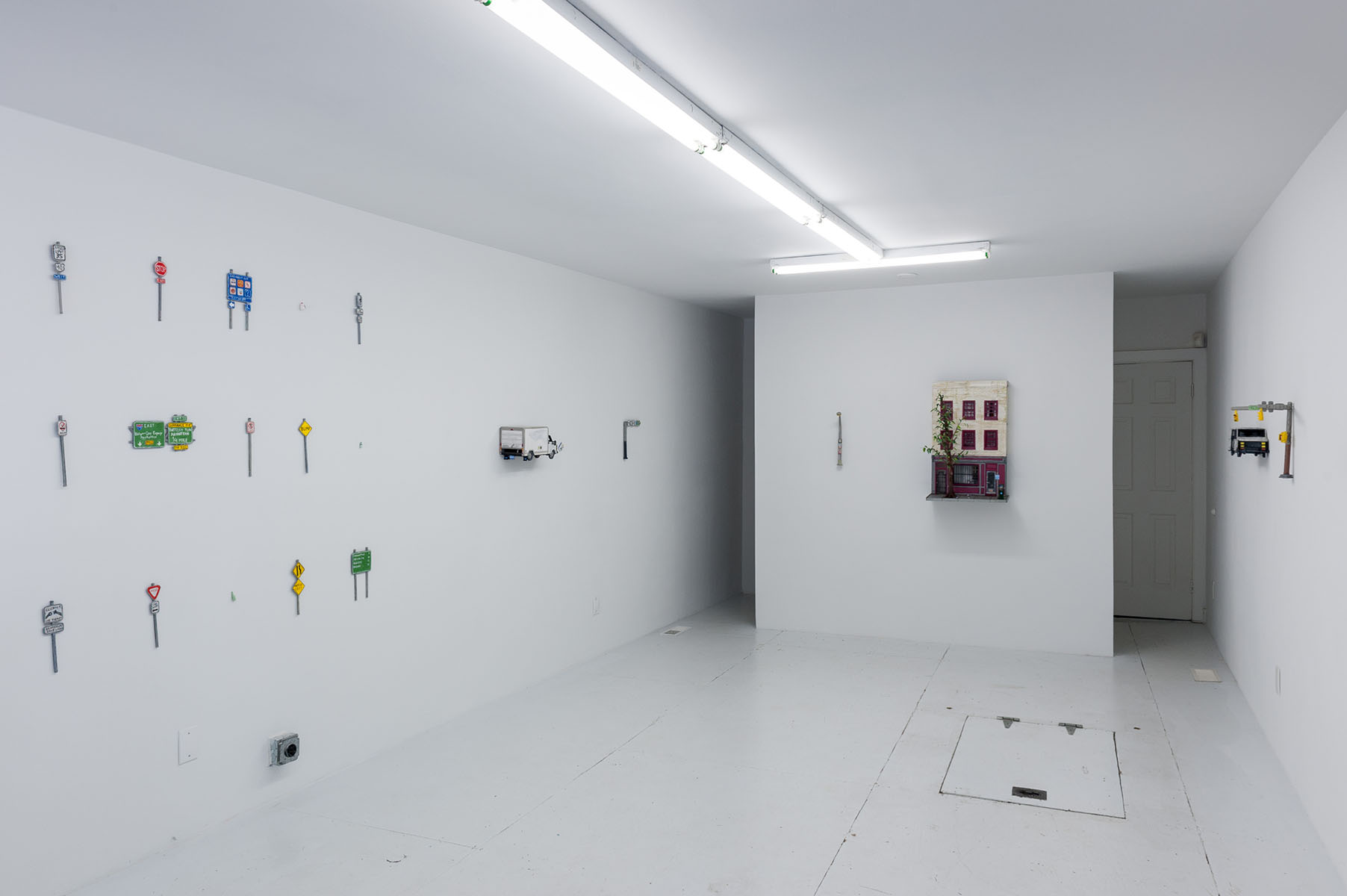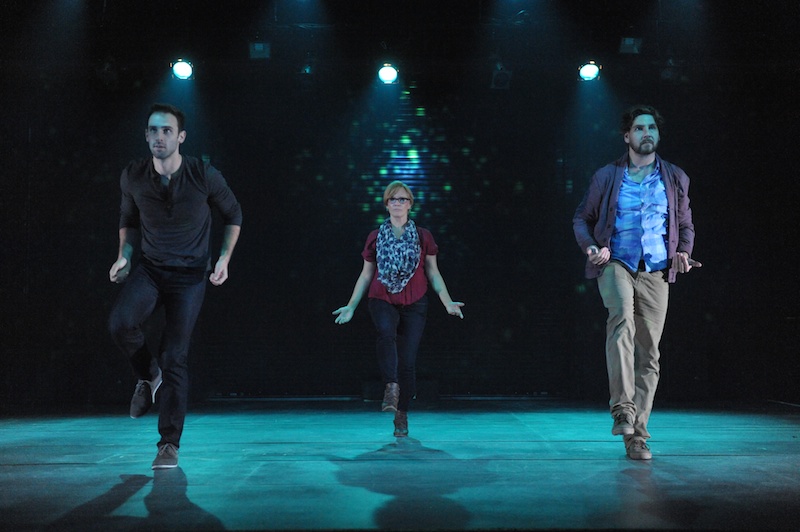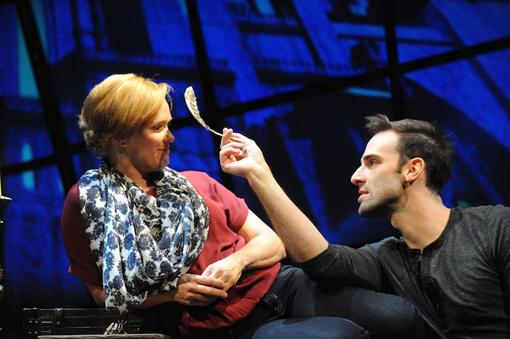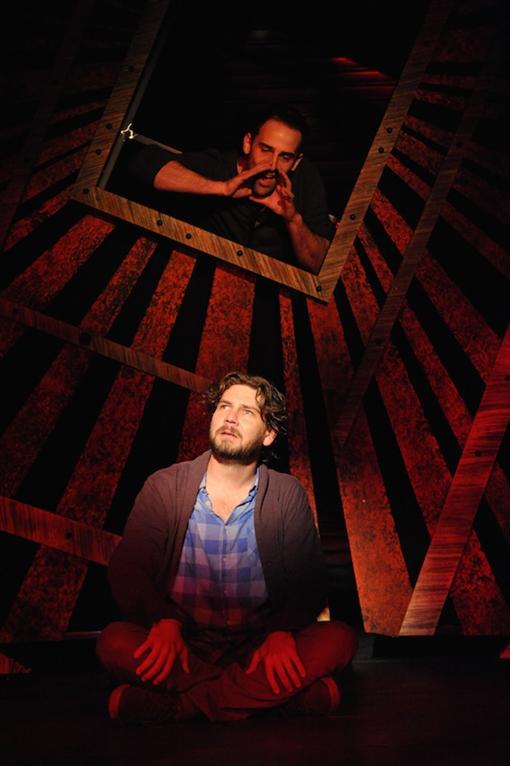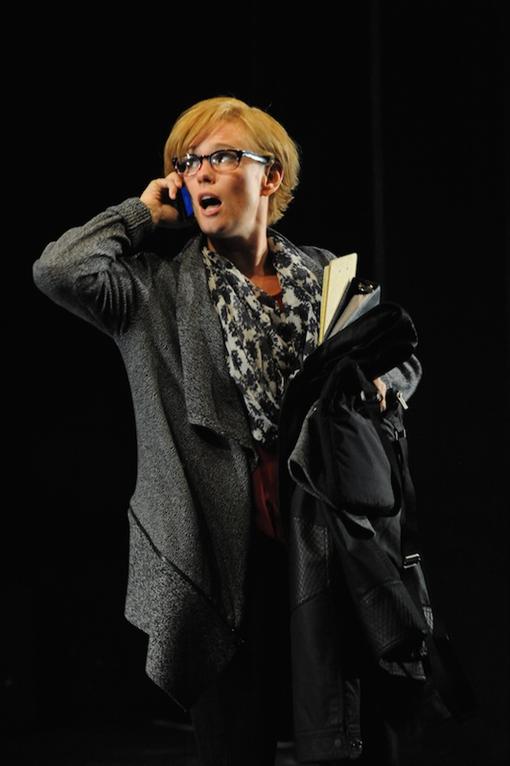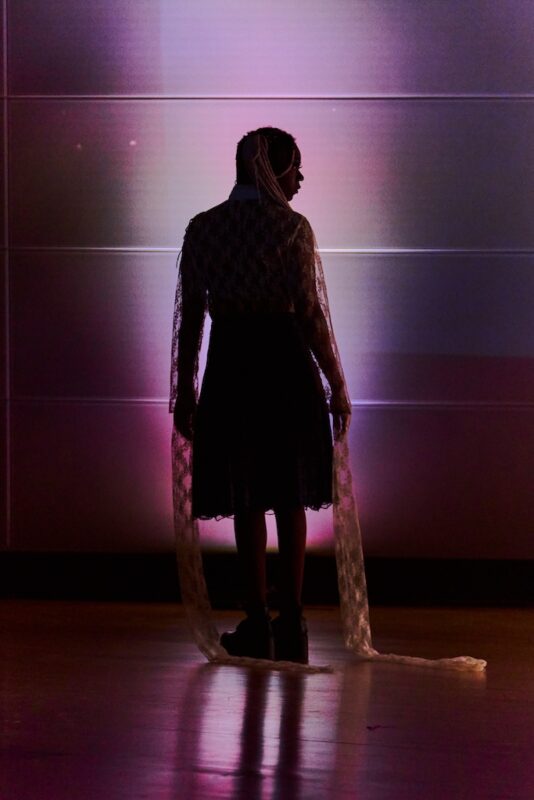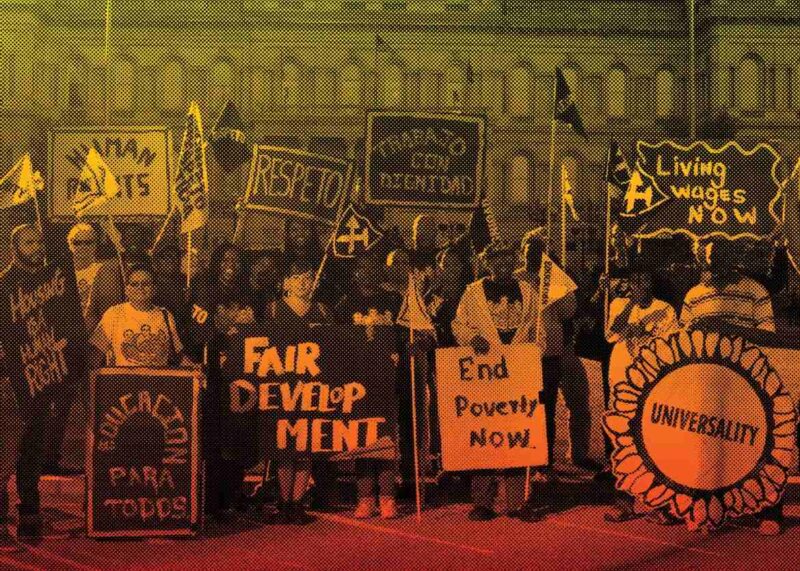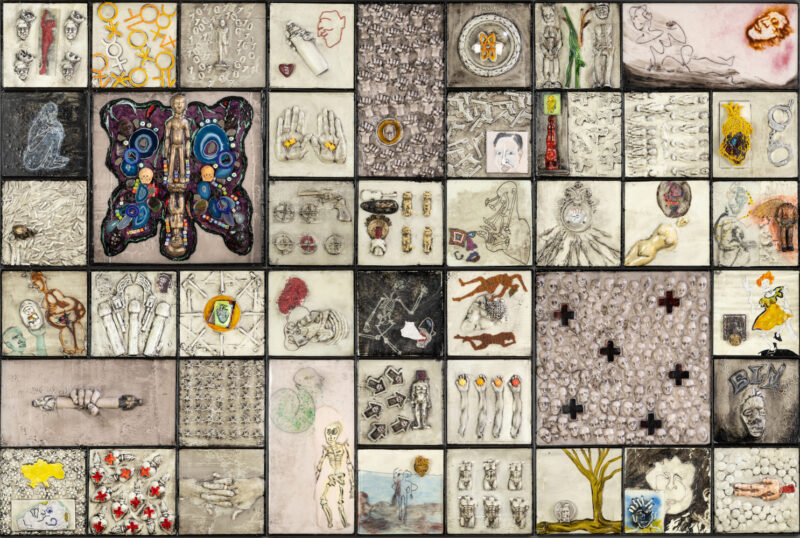Bret McCabe reviews The Understudy at Everyman Theatre
Roxanne (Beth Hylton) had enough bullshit to deal with before he showed up. Yes, it sucked when she put her acting career on hold to become a stage manager, but at least the work is steady. She is good at it, and she’s working this Broadway production of an undiscovered play by none other than Franz Kafka. It features a big-time Hollywood star, the kind of actor who commands $20 million a picture and all but runs this production. And Roxanne, as if punished for being competent, routinely becomes the person the producers call when they need something done for him. This marquee name is paired with mid-level action hero, Jake (Danny Gavigan), a pretty boy with a new confidence in his strut because his big-budget blockbuster scored a sizable opening-weekend box office. Jake will interrupt a conversation with her to take a call; it might be his agent, who is trying to leverage Jake’s recent success into another picture.
Broadway, of course, isn’t the movies, and Roxanne has called Jake to the theater to go through scenes and break in his understudy, the guy who will know the lines just in case Jake can’t perform one night. Roxanne runs this rehearsal, headset curled around her short red hair, one hand forever glued to her marked up copy of the script in a black binder, her cell phone always on the ready should she need to call the producers. And who shows up to this circus as that understudy? Of all the out-of-work actors, the no-names, the going-nowhere dreamers who need to take any gig to pay the bills? Harry (Clinton Brandhagen), the guy who walked out on their engagement six years ago. Where’s that prop gun?
Playwright Theresa Rebeck‘s ribald and occasionally disparaging black comedy The Understudy turns Broadway acting into a Kafkaesque nightmare. That this metaphor is narratively actual is part of the script’s blessing and curse, which director Joseph Ritsch wittily juggles in Everyman Theatre‘s current production of the backstage farce. Ritsch, making his Everyman directing debut, and his nimble three-member cast know how to land Rebeck’s tart sarcasm, when to go for the broad laugh, and when to ease up just enough to allow the play’s nonpoisonous venom to become momentarily debilitating.
Rebeck takes aim at Broadway’s reliance on celebrity to put asses in seats, a lament that’s percolated through theater talk for more than a decade now, turning the stage into that place where movie stars, to use the fashionable business-speak of creative labor these days, rebrand themselves. When The Understudy debuted on Broadway in 2009, New York Times critic Christopher Isherwood identified the play’s subject as “the corruption of the American theater by the public’s and the industry’s obsession with celebrity”; by 2013 he feels that corruption had become status quo:
“It’s no secret that safety-first has more or less become the motto of what was once grandly called the Great White Way. Producers looking for insurance against the long odds of commercial success almost always favor market-tested products, preferably gilded movie stars in central roles or, failing that, new work from playwrights with established reputations.”
That situation can sound a little inside baseball if you do your theatergoing in Baltimore, where—like any city that isn’t New York—its professional theater community isn’t focused on maintaining the $1.193 billion Broadway grossed in 2013. Everyman and Ritsch recognize that while Rebeck’s Understudy is a rant about how theater is run these days that just beneath that backstage trolling is a much more poignant commentary about that place where most artists spend the days and lives—out of the spotlight, further down the ladder of name-recognition and pay scale, and where your audience is chiefly your peers. This Understudy aims to make you laugh so much that you forget that the only thing more ludicrous than a three-hour Kafka play as star vehicle—with a dance sequence—is trying to forge a career as an artist.
Laugh you do, as this 90(ish)-minute without intermission production runs at a brisk clip. The cast is a well-calibrated trio, and the play unfolds like a series of solos, duos, and ensemble bits as Roxanne tries to get Jake and Harry to run scenes, Jake and Harry childishly spar over movie vs. stage acting, Roxanne and Harry talk around their shared past before confronting it, and Roxanne and Jake become foxhole buddies in the trenches of a job that exists only because somebody more famous and powerful makes it so. The unnamed play Understudy‘s characters work on is a recognizable mish mash of Kafka’s works, and as Jake and Harry run scenes you suspect it hovers somewhere between the BBC radio drama Kafka: The Musical and The Producers‘s Springtime for Hitler—either it is so ingeniously conceived it’s novel or so preposterous it’s an insane nightmare.
These extremes give the cast room to have fun. Brandenhagen’s understated charisma makes Harry an all too familiar figure. He’s the guy who wants to talk all night about artistic integrity while he’s sleeping rent-free on your couch for a few months. He’s got the garrulous intelligence of the teenaged wiseacre who is maturing into a hardened cynic, and his opening monologue dissecting Jake’s action flick is a tour-de-force of ordinary jealously, equal parts David Mamet anger and McSweeney’s snark. He’s the adult who hasn’t quite entirely figured out how to let go of immature pettiness, and yet when Harry acts opposite Jake you get a sense of where all that bitterness comes from.
He simply knows what he’s doing onstage. All the manic, stooped-shouldered energy that’s roiling just beneath his skin’s surface gets reined in. His posture changes, the cadence of his voice shifts, and the annoying smartass blooms into a persona. Harry’s got the skill to back up his enmity.
Gavigan has the tougher rope to pull here as Jake; he’s got to come across as an actor who has to use his good-looking presence to compensate for middling talent. Jake in character is a bit stiff, robotic, and studied—you get the feeling Jake has closely watched every Inside the Actor’s Studio interview looking for craft secrets and has never seen an acting technique workshop he hasn’t thought about attending. Gavigan impressively realizes an insecure guy pretending to be an alpha male, infusing Jake with that self-satisfied streak that makes Ben Stiller such a fuckwit.
Hylton, however, is tremendous. The actress bounces from mousy jilted bride to confident seductress to frazzled stage manager to furious woman scorned, very often in the same scene. Rebeck’s script, like the Hollywood movies it mocks, relies on a number of conventions to keep putting its characters into different scenarios. That includes making Roxanne the passing romantic interest to both Jake and Harry, turning their thespian ego contest into a romantic triangle and forcing the woman they both kissed into having to discipline them like a scolding mother. Such rollercoaster mood sways allow Hylton to showcase that she’s the Jimi Hendrix of portraying a woman whose default setting has become totally about to lose her shit.
Hylton handles this cartwheeling with a steely aplomb, and she gets some of the play’s best lines. When Harry goes off on one of his smarter-than-thou acting tangents she finally has to remind him about where he resides in the grand scheme of things: “You have no rights. You are an actor. You’re not even an actor. You’re an understudy.”
It’s a line that scores a hearty, knowing laugh—who hasn’t been at the bottom of the career ladder? What makes this Understudy a bit more potent is how Ritsch and the cast understand that no matter how hard these artists climb there’s always somebody above you, making jobs and livelihood vulnerable to someone else’s whims. As written, The Understudy ends on a contrived note of solidarity and uplift, a gentle kiss after the play’s satirical barbs. Ritsch and his cast strike a slightly different and more vulnerable note, turning a silly moment of dancing in a Kafka play into reflective shrug about the absurdity of the artist’s life. Come for the belly laughs; savor the cosmic ones.
